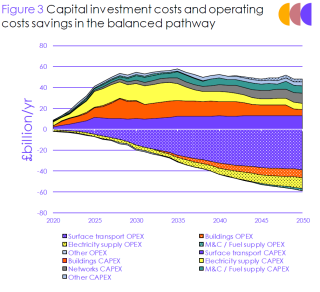The Climate Change Committee (CCC) calculates by spending less than 1% of GDP a year, polluting emissions can fall by 78% by 2035, compared to 1990 level. Just 18 months ago this was the UK’s 2050 goal.
“By the early 2030s, every new car and van, and every replacement boiler must be zero-carbon; by 2035, all UK electricity production will be zero carbon,” the CCC says.
The CCC’s Sixth Carbon Budget (2033-2037) says that investment across all buildings (residential and non-residential) is needed at an average rate of around £12bn per year to 2050, offset by reductions in operating costs of £5bn per year:
Total investment costs are £360bn to 2050, of which around £250bn is for the programme of upgrading homes and £110bn in public and commercial buildings.
It is not just new homes that will have to meet Net Zero standards; if the government accepts CCC's recommendations, every existing home, regardless of heritage, will have to attain an energy performance certificate rating of at least C. Any that does not have a rating of C or higher will not be allowed to be put on the market after 2028.
The report says: “This is a major investment programme which, if managed well, can have strong economic benefits. In particular, the investment can act as a stimulus and create skilled employment throughout the UK, with the Construction Industry Training Board (CITB) estimating over 200,000 new jobs in this scenario. There is strong reason to believe these jobs would be additional to the current workforce. Energy efficiency retrofits are expected to provide new jobs and have already been recognised as an important part of the green recovery. Low-carbon heat installations, while replacing fossil fuel installations, are expected to drive additional jobs due to the additional labour required for more complex installations and household conversion.”
It adds: “Upgrading the building stock will deliver a significant set of wider benefits in terms of improved comfort and health, particularly for the fuel poor. The current estimated cost to the NHS from poor quality housing is £1.4-2bn per year, in England alone. Energy efficiency – done alongside ventilation and shading upgrades – can improve comfort levels year-round and guard against damp. The retrofit of homes to both address and adapt to climate change has potential to deliver regeneration benefits. More widely, the shift to electrification and heat networks can also deliver improved energy security and improved air quality. There is some evidence to suggest that there could also be air quality benefits from switching to hydrogen heating in terms of reduced NOx emissions, although further research is needed.”
Climate Change Committee chairman Lord Deben (the former government minister John Gummer) said: “The Sixth Carbon Budget is a clear message to the world that the UK is open for low-carbon business. It’s ambitious, realistic and affordable. This is the right carbon budget for the UK at the right time. We deliver our recommendations to government with genuine enthusiasm, knowing that Britain’s decisive zero-carbon transition brings real benefits to our people and our businesses while making the fundamental changes necessary to protect our planet.
“As we emerge from the Covid-19 pandemic, the Sixth Carbon Budget is a chance to jump-start the UK’s economic recovery. Anything less would shut us out of new economic opportunities. It would also undermine our role as president of the next UN climate talks.”
Among the most enthusiastic supporters of the CCC’s recommendations is the Heating & Hotwater Industry Council (HHIC) but it said that the targets could prove aver-ambitious.

HHIC director, Stewart Clements, said: “We welcome the CCC’s ambition to have 5.5 million heat pumps installed by 2030 and also the recognition of hydrogen and the real potential it offers to decarbonise heat, affordably.
“HHIC represents the whole heating sector and we will be working with our members to understand the implications of this report and how we can assist BEIS with the transition. As an industry we are committed to helping and supporting the UK reach our carbon reduction targets.
“However, we must proceed with caution. Having ambition is positive but we have to be prepared for what happens if we can't meet that ambition. The accelerated timelines will be very difficult to achieve in practice. BEIS [the Department for Business, Energy & Industrial Strategy] needs to urgently engage with the heating industry to fully understand what we can start to deliver, and what we will need to put into place.
“For example, more work is going to be needed on reskilling the workforce and developing supply chains. Red tape will need to be reduced to allow greater participation in government support schemes like the Renewable Heat Incentive and Green Homes Grant. If a collaborative approach is adopted, the heating industry is confident it can reduce emissions to meet our net zero goals.”
Association for Consultancy & Engineering (ACE) chief executive Hannah Vickers said: “The Sixth Carbon Budget reinforces the urgency for all to step-up to the plate and highlights that no sector can be left behind on society’s Net Zero journey. Our own research released this week shows most areas of the bult environment are still worryingly underprepared, with water, ports and airports currently the least ready for Net Zero. As well as changes to policy and programmes, consultants will need to lead by example and offer carbon free designs for every project they work on if we are to make the rapid progress required.”
The ACE’s study, Are we ready? Delivering Net Zero in the built environment, polled more than 130 Net Zero and sustainability practitioners who work across different areas of the built environment. The findings show few sectors rating highly with common challenges such as client business models being incompatible with Net Zero pathways, and disconnects between different regulators.
Baxi Heating managing director Karen Boswell said: “The latest recommendations from the Committee on Climate Change (CCC) provide ambitious targets for the residential and commercial heating market whilst acknowledging that clear change is needed to meet these targets. We recognise the role of sustainable heating technology in achieving these goals and welcome the plans for all new boilers to be hydrogen-ready by 2025, and the ambitions to achieve 5.5 million heat pump installations by 2030.
“We fully support these low carbon technologies; we are proud to be developing and testing one of the UK’s first 100% hydrogen boilers, and have recently launched our own comprehensive range of high-performance heat pumps.
“We believe the CCC’s ambitions will require the backing of robust policy to make this roadmap a reality. Plans for EPC Band C rating to be able to rent and sell homes, in addition to the phasing out of oil and fossil fuel boilers off the gas grid, are examples of this. A strong consumer education campaign will also be important for supporting homeowners and commercial building owners to make the necessary changes.
“There are several important publications expected in the near future, which should help to further shape how the UK will set out to achieve net-zero carbon emissions by 2050 and create an even clearer view. This includes the imminent energy whitepaper, BEIS heat and buildings strategy and a UK hydrogen strategy.”
Got a story? Email news@theconstructionindex.co.uk




